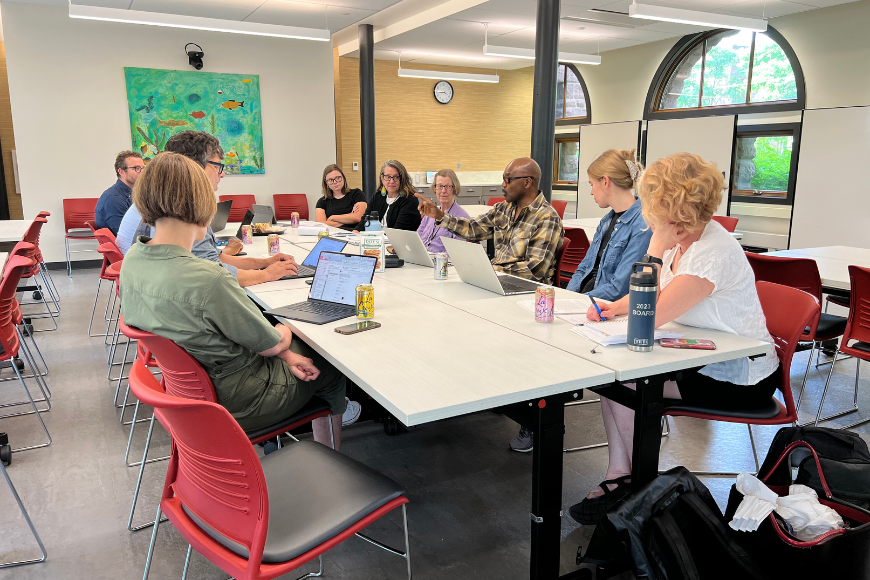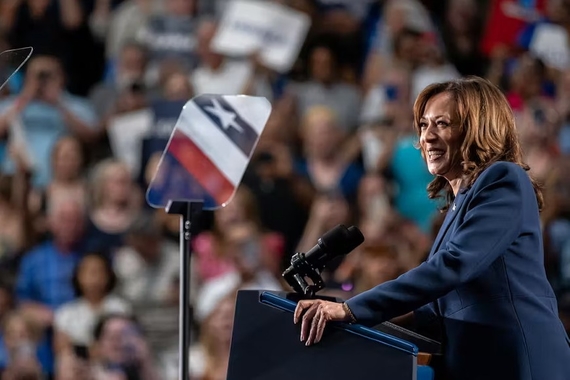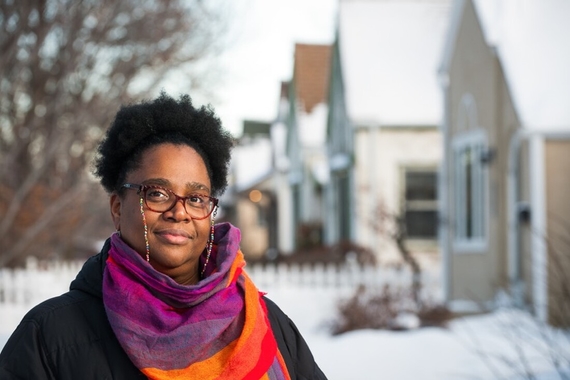Human Tolls, Hidden Stories
Dr. Ernest Lloyd is preparing to tell the story that has been haunting him for decades.
Lloyd has partnered with Associate Professor Greg Donofrio (School of Architecture) to share his story and others’ through a community-engaged book project titled Human Tolls: Public Histories and Community Responses to Twin Cities’ Freeways. Their project is the latest residency in the college’s Liberal Arts Engagement Hub.
A pilgrimage to Minnesota
“Greg Donofrio and this relationship have provided an opportunity for me to unpack and bring to the surface some hidden stories that need to be told,” shares Lloyd. “And the story that I want to tell I’m finally telling—my life, my endeavors, my pilgrimage.”
That pilgrimage began with a job offer in 1980.
Lloyd earned undergraduate degrees in history and government from St. Augustine University in North Carolina and a master’s degree in history from Iowa State before he was recruited for a position with the Minnesota Department of Transportation. There, he spent nearly 40 years gaining expertise in public administration and transportation policy while advocating for women- and BIPOC-owned businesses to have access to construction contracts building roads, bridges, and highways.
During his tenure with MnDOT, Lloyd also enrolled in Hamline University’s doctoral program in public administration. His experiences—and identity—would shape his dissertation, “How Routing an Interstate Highway Through South Minneapolis Disrupted an African American Neighborhood.”
He completed his program in 2013, but the ripple effects of Lloyd’s publication were just beginning.
Housing and the freeway
At the University of Minnesota, Donofrio was embarking on a research project of his own, collaborating with communities of color to document how racism and privilege influenced South Minneapolis’ “built environment.” This work led him to the Arthur and Edith Lee House, a historic home located in the Field neighborhood of Minneapolis.
“[In 1931,] a young Black family sought to buy a house in a ‘white neighborhood,’ and a series of riots ensued over this housing integration,” says Donofrio. “This was a really fascinating project where we worked with community members and students to understand what happened and also how BIPOC people understood that history.”
Inspired by the Arthur and Edith Lee House, two of Donofrio’s graduate students developed an exhibit for the Hennepin History Museum. Denise Pike and Kacie Lucchini’s “Owning Up: Racism and Housing in Minneapolis” explored the history of racial housing discrimination in Minneapolis through the stories of three Black families, including the Lees.
And as they prepared for the exhibit, more hidden stories began to emerge.
Donofrio and Pike observed that many of their community conversations about housing were inextricably linked to conversations about the freeway—both as a destructive force and as a segregating influence in South Minneapolis. Incidentally, the exhibit opened just as reconstruction was beginning on Interstate 35W. Donofrio and Pike saw an online reference to Dr. Lloyd’s dissertation, located a copy at Hamline, and embarked on their own pilgrimage to track him down.
“We thought, wow, this guy has written an amazing dissertation, and it just deserves to be seen so much more,” says Donofrio. “We realized there were super interesting questions we could dig into that deserved more investigation. Denise and I went out to meet him and were instantly taken in by this guy who has since become a dear friend and collaborator.”
Re-telling history
Together, Donofrio, Pike, and Lloyd spearheaded A Public History of 35W, a multi-year, community-engaged research initiative that centered the experiences of residents affected by the construction and ongoing use of 35W. While published research about the freeway creation indicated little community opposition to the project, Donofrio and Lloyd questioned whether that was true and sought to identify voices that were not well documented in the existing historical record.
Today, their book project and Hub residency represent the culmination of years of research, community collaboration, and a commitment to rewriting Minnesota’s transportation history.
Human Tolls incorporates the perspectives of the people most affected by the legacies of racist transportation planning. These authors include BIPOC community members, engineers, planners, and transportation administrators.
For some, like Dr. Brian Muthyala, the contribution is both personal and professional. As a physician, Muthyala is interested in the public health impact of freeways, but he also went to grade school in the Rondo neighborhood. Similarly, community member Marvin Anderson, who is widely thought of as the “Mayor of Rondo,” recalls bulldozers destroying his neighborhood as a child. He’s made it his life’s work to remember and commemorate Rondo–an opportunity presented through this book project.
Donofrio and Lloyd are also contributing essays and serving as the book’s co-editors.
Since April, they’ve used the Hub space to bring together authors and offer feedback on one another’s essays in a safe, collaborative environment. Lloyd describes the process as beautiful and inspiring for the writer and the reader.
“We’re empowering these individuals to say, ‘there’s something I want to share with society,’ to allow them to feel good that they have contributed to this body of knowledge. And we hope it will allow readers to feel a sense of pride for what it took for the author to do that, to share their understanding and perhaps joy and pain.”
The Liberal Arts Engagement Hub
Human Tolls: Public Histories and Community Responses to Twin Cities’ Freeways is one of five Hub Residencies for the 2022-2023 academic year. The Liberal Arts Engagement Hub seeks to facilitate reciprocal and trusting partnerships between humanistic scholars in the arts, humanities, and social sciences and the community to respond to important social challenges.



